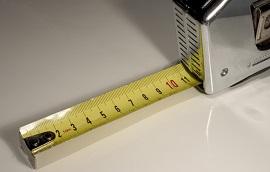If you are shopping around for a new air conditioner, you are likely to be aware that there are many different sizes of unit available. With many appliances, bigger is often better, but this is not the case with air conditioning equipment. Choosing a unit that is too big or even too small could end up costing you a great deal in the long term. Therefore, you should be aware of the principles of proper air conditioning sizing.
The Consequences of an Undersized Air Conditioner:
Even if you have a rather modest budget, it is important not to choose an air conditioner which is too small for your requirements. While the initial cost of the unit may be less, it is likely to end up costing you more and failing to properly cool your home. With a unit that is undersized, your home could never reach your desired temperature. The unit will run for prolonged periods as it attempts to decrease the indoor temperature, but it lacks the power to accomplish this. This places excessive pressure on the system, triggering the compressor to overheat and compromising the appliance. With an undersized air conditioner, you are unlikely to enjoy the full lifespan of the appliance and will end up needing to replace the unit in only a short time.
Bigger Isn’t Better:
If you choose an air conditioner that is too big, it can lead to big problems. An oversized air conditioner will be unable to cycle long enough to sufficiently remove humidity from the air. This pattern of short cycling will mean that your air conditioner unit will be turning on and off frequently, increasing component wear and tear. This could cause damage to the compressor or worse trigger cascade failure which would require serious repairs or a replacement unit.
What is a BTU?
BTU or British Thermal Units are the way in which an air conditioner cooling capacity is measured. Air conditioning professionals assess the measurements of your home to calculate the correct BTU for your installation. The technician will need to consider the type of construction of your home, the type and amount of insulation, the type and placement of your windows and doors, the shading around the outside of the home and the number of people in your household. While there are some calculator tools available to estimate the size of air conditioner required, it is best to leave these calculations in the hands of the professionals.
Although your budget is important, the price should never be the only consideration when buying a new air conditioner. While the initial price may be less, if you opt for a unit which is too small or too large, you will end up paying far more in the long term. You may regret saving a few dollars if you need to replace the entire unit in only a year or two. Additionally, since the unit was not properly sized, you may find that your manufacturer warranty is voided, leaving you with no recourse and a costly replacement bill.
